This week, the BBC has been showing a mini-series online, Pond Life, in anticipation of Season 7 (airing tomorrow, Sept 1st at 7.20pm on BBC 1. Asylum of the Daleks is set to bring the Ponds back in the Doctor's life, and in this enjoyable and often humorous series, we finally get to understand why.
All five parts can be found below. Make sure you check it out!
Part 1
Part 2
Part 3
Part 4
Part 5
Where one writer leaves all his thoughts on books, music, writing and his daily life
Friday, August 31, 2012
Guest Post by Sophie Duncan: The Sidekick - Plucky, Loyal and Just a Tad Annoying
Well, it's double thanks to Paul today, 1 for hosting me and 2 for organising this blog tour (and thanks to Literary+ for making it possible).
The Sidekick - Plucky, Loyal and Just a Tad Annoying :).
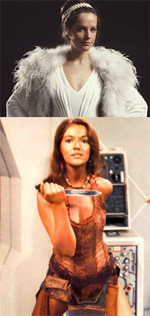
Ever since I was little, I've always been a fan of sidekicks. Maybe it's because I grew up watching Dr Who, a show in which the Doctor's companions are very important. I always missed them in the episodes when the Doctor was alone. I was exposed to my first kick-arse woman in Dr Who, Leela, the Sevateem warrior who liked her Janus thorns just a little too much. I also love Mary Tamm's Romana, but I only got to watch her in reruns, I was too young to watch the shows on the TV. The Doctor's companions used to have to put up with quite a lot and I liked it when they managed to get one up on him.
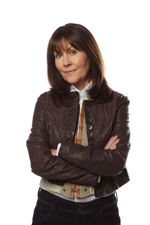
The Doctor and his companions is the classic power dynamic between hero and sidekick: the hero knows more, is generally better at stuff and is frequently explaining things to his/her younger companion and thus explaining things to the reader/viewer. However, because there were so many companions, Dr Who did get to crack the mould. The Doctor remained (mostly) in charge, but the likes of Sarah Jane Smith could make their mark and stepped out of the Doctor's shadow, especially so with Sarah Jane, who eventually had her own series.
I was being flippant with my title when I described the sidekick as annoying, it's not a universal truth, although I have to admit, some have turned out that way, or at the very least started that way. A character I loved as a child, Adric, again from Dr Who, annoys the hell out of me as an adult, I just want to smack him over the head for being willful, childish and arrogant. Richie Ryan from Highlander The Series, in the first episode I saw, I wanted to take a sword to his neck, but he grew on me, so much so, I preferred him to The Highlander himself. Richie is an example of a sidekick growing beyond the role in which he starts. There were five seasons of Highlander (well, okay there were six, but some of us don't talk about #6) and Richie grew from rebellious teenager, there to generally get in trouble so Duncan could moralise at him, to a mature, independent immortal who then began to lose his usefulness for the writers, because he was too like the other immortals in the show. Personally, I liked the adult Richie, he was a sidekick who came of age, someone who could stand up to McLeod, a more modern companion.
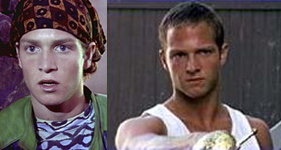
Richie was not the first sidekick to do this, we have the likes of Robin becoming Nighthawk in the Batman comics as well. And maybe in written media, comic serials and book series that run over a longer time-frame than TV, sidekick growth is easier to accommodate and you also don't have to worry about the actor getting older, either. I suppose my sidekick character in Death In The Family is Sean, he's younger than my protagonist, Tom, but they share common goals and Tom feels protective towards him. I certainly see him growing and changing over the sequels, after all, he is currently fourteen, a time of transition from child to adult. In fact, I intend his evolution to be as much part of the story dynamics as Tom's. I won't be using him as a stooge, nor as an example of how not to do things, the sidekick in modern literature is far more sophisticated than the 2D characters of old TV, e.g. Scrappy-Do from Scooby-Do, Vince Romano from TJ Hooker, Penfold from Dangermouse.
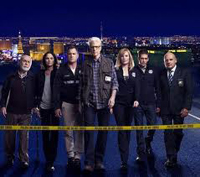
Unlike the aforementioned traditional sidekicks, who were generally stuck in their ways with a particularly annoying catch-phrase if you are really lucky, Sean does get to take the lead in some things, he knows more about their mutual condition than Tom does and at least in the beginning, he is the stronger character. Modern sidekicks are more than there for the 'but why Doctor's of old. In fact, a lot of stories are moving to the ensemble model where there is not such a distinction between leader and supporter. In TV, this can be seen in the likes of CSI, where there is always a lead figure, but the sidekicks, or rather, subordinates are no longer on the side, they have almost as big a role in proceedings as the head honcho. There are, of course, always the mentor-mentee moments, providing the classic one-on-one learning experiences, but there is not so much of the subordinate being there just to get it wrong so the hero can show them how it's done, because *gasp* in our modern world, even heroes are allowed to be fallible.
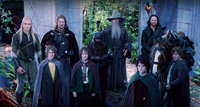
Ensemble structures are not something I've played with a lot in my writing, I suppose the classic is the fantasy quest adventure, the likes of J R R Tolkein's Lord of The Rings, where there are many characters each striving for the one goal. I tend to veer towards one or two characters when I'm writing, so this group dynamic is a challenge for me, making sure each character has enough 'air time' and this style of story lends itself to an omnipotent view point, also not a narrative mode I go for. Still, I do have a short story that I released for The Wittegen Press Giveaway Games, Samling Born, that will be developing into an ensemble format novel, so I better get practising.
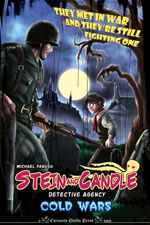
Despite the rise of ensemble shows on TV, I don't believe the hero-sidekick relationship will go away, especially not in written format. There is still something to say for the best-friends and/or master-student relationships that this dynamic creates. Much good literary material lies in 'wise sage give young apprentice advice' and, in modern relationships, the inverse is also true, teachers can learn from their pupils. I think, due to the flexibility of our format, a novel writer can develop a much more nuanced and intimate relationship between characters than a forty-five minutes a week TV show and the sidekick has his or her role to play in many stories. They are there to: help the reader learn about the environment the author is creating; maybe lighten the mood from time to time; keep the hero on the straight and narrow (there is a particularly good example of this in The Stein and Candle Detective Agency #2: Cold Wars where Weatherby makes his opinions known to Mort when Mort's actions become questionable).
I think the role of the sidekick can be summed up by saying that they, more often than not, provide the humanity a story needs. Your hero/protagonist can be a psychotic bastard, as many of the darker superheroes can be from time to time, if you have that small breath of loyal, earnest humanity in the form of the, yes I'll use the term, plucky sidekick.
Sophie Duncan
Sophie was born with the writing bug in her blood, boring her primary school teachers with pages of creative writing and killing her first typewriter from over use when she was thirteen. She began publishing her work on line while at university where she discovered the internet and fanfiction. It took another decade for Sophie to realise her long-time dream of releasing her own original fiction as an author through Wittegen Press.
Death In The Family (Heritage is Deadly #1)
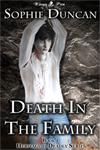
Leaving a good London school with solid prospects, Tom Franklin has the world at his feet. Yet one thing has always haunted his perfect life: his dreams. When Tom discovers that the nightmarish images of dark places and even darker instincts are in fact repressed memories from his early childhood, he must face the heritage from his birth-father, a savage vampire known only as Raxos.
Realising his memories are his only hope of controlling his awakening instincts, Tom returns to, Coombedown, the sleepy, Cornish village in which he was born, unknowing that the night-breed in his veins will lead him into danger.
Death In The Family is a young adult, paranormal novel.
Death In The Family Literary+ Blog Tour Schedule:
- 27th August 2012: Is it the teeth? - vampires and why we like them. Host: Brooke Johnson
- 28th August 2012: Scare me, Shock me - paranormal fiction vs horror. Host: A. K. Flynn
- 29th August 2012: For Mature Eyes Only - when does romance become erotica? Host: JD Savage
- 30th August 2012: There were 3 in the bed... ménage, ewww or gimme gimme! Host: Tressa Green
- 31st August 2012: The Sidekick - plucky, loyal and just a tad annoying :) Host: Paul Carroll
- 1st September 2012:Feedback - Taking It - Giving It - Enjoying It. Host: Leonard Suskin
- 2nd September 2012: Mad With It - The Highs and Lows of A Writing Imperative Allisyn Bridges

Literary+ is a marketing initiative which was founded and led by Shen Hart. This is a time of evolution and progress, the market is being opened up to e-books and self-publication. As a fellow writer, Shen understands that self-publication is a hard and often lonely road. She started Literary+ to bring together authors and related creative specialities with the goal of helping each other. With a tight knit, friendly and welcoming community at its core, Literary+ holds a strong focus on marketing. As Literary+ continues to grow and evolve it will use innovating, original and experimental marketing methods and schemes to get its member’s books into their reader’s hands.
Sunday, August 26, 2012
Do I Need a Tablet?
I've decided to save up and buy a tablet computer. But not an iPad. It just doesn't appeal to me.
To help me on my way, I counted the money in a jar in my room, with the money in a chest in my room, and the coins from my wallet. A surprising sum total of €42.73. So that's fun. Obviously nowhere near my target, but I can put money aside every week to get this. Because let's be honest: I really want a tablet.
I need to be able to write on the go, and a laptop isn't exactly convenient to bring into college every day in 4th year. Mine has a 15.5" screen, so it's a tad on the big side.
Yes, I am trying to justify this.
So here's some more justification: I'll be in college a lot with Drama this year, again. It won't do to have to carry the laptop bag with me every night from the bus stop, and I can't attempt what I did last semester, putting my laptop into my regular bag with everything else. The bag didn't survive that...
Something lighter, and something I don't need to plug in to be able to use all day, is exactly what I need to get my work done. I won't be formatting everything on the tablet, but I won't need to. There are computers in college. Just not where I need them to be (i.e. in the canteen, or in the lecture room where we rehearse).
I also need to be able to write on the bus. When the traffic gets heavy in the morning, I'm generally left with nothing to do. Reading is mostly out of the question, because pretty much everything I bring to college is overtly religious. That's not fun exposure to the world. Especially not when the only thing I have is a Bible.
We'll move swiftly on from there, shall we?
I'll get a lot more work done with a tablet. That's just a fact. I'll keep it clear of games, if I can. They're not a good use of my time. I'll probably put a puzzle game on it, or something, just in case I'm too tired for work but not wanting to waste an hour of my life on something else.
Also, Internet access. My iPod is okay, but it's old and it refuses to do most of what I want it to do. And, you know, no camera.
Have I convinced you that I need this, yet? Let's look at my regular day from last year:
Up early. Early enough to get a bus at 8. I can't wait much longer, or I'll get stuck in traffic. If I miss the 8 bus, I'm twice as long getting into college.
Lectures started at 9 or 10. I'll need something to do before they start. In fact, I really have to do something before they start. I would usually end up on Facebook or Google+ or Twitter in the morning, until someone else came along.
Lunch. An hour and a half of talking to friends, attempting to get work done, Drama, or a mix of all three. Work is significantly more difficult when it involves finding a place to set up a laptop.
After lecturers, but before Drama, I had a two or three hour wait. I usually filled this in the same way I filled the morning: meaning to do work, ending up on social networking sites.
After Drama: a bus ride home.
Basically looking at a lot of time to use the tablet in the day when I instead used my laptop. And, you know, this would be much more convenient. Not just for setting up for work, but also to carry into college. My laptop bag gets annoying after a while, and I hate being stuck with it at my feet all day in college. It's caused more than one person to trip in the past.
How about now? Are you convinced?
I am. I am definitely going to save up for this. I need it. Or, I perceive that I need it. And if either of us need any more persuasion...
My childhood clearly wants me to do this.
To help me on my way, I counted the money in a jar in my room, with the money in a chest in my room, and the coins from my wallet. A surprising sum total of €42.73. So that's fun. Obviously nowhere near my target, but I can put money aside every week to get this. Because let's be honest: I really want a tablet.
I need to be able to write on the go, and a laptop isn't exactly convenient to bring into college every day in 4th year. Mine has a 15.5" screen, so it's a tad on the big side.
Yes, I am trying to justify this.
So here's some more justification: I'll be in college a lot with Drama this year, again. It won't do to have to carry the laptop bag with me every night from the bus stop, and I can't attempt what I did last semester, putting my laptop into my regular bag with everything else. The bag didn't survive that...
Something lighter, and something I don't need to plug in to be able to use all day, is exactly what I need to get my work done. I won't be formatting everything on the tablet, but I won't need to. There are computers in college. Just not where I need them to be (i.e. in the canteen, or in the lecture room where we rehearse).
I also need to be able to write on the bus. When the traffic gets heavy in the morning, I'm generally left with nothing to do. Reading is mostly out of the question, because pretty much everything I bring to college is overtly religious. That's not fun exposure to the world. Especially not when the only thing I have is a Bible.
We'll move swiftly on from there, shall we?
I'll get a lot more work done with a tablet. That's just a fact. I'll keep it clear of games, if I can. They're not a good use of my time. I'll probably put a puzzle game on it, or something, just in case I'm too tired for work but not wanting to waste an hour of my life on something else.
Also, Internet access. My iPod is okay, but it's old and it refuses to do most of what I want it to do. And, you know, no camera.
Have I convinced you that I need this, yet? Let's look at my regular day from last year:
Up early. Early enough to get a bus at 8. I can't wait much longer, or I'll get stuck in traffic. If I miss the 8 bus, I'm twice as long getting into college.
Lectures started at 9 or 10. I'll need something to do before they start. In fact, I really have to do something before they start. I would usually end up on Facebook or Google+ or Twitter in the morning, until someone else came along.
Lunch. An hour and a half of talking to friends, attempting to get work done, Drama, or a mix of all three. Work is significantly more difficult when it involves finding a place to set up a laptop.
After lecturers, but before Drama, I had a two or three hour wait. I usually filled this in the same way I filled the morning: meaning to do work, ending up on social networking sites.
After Drama: a bus ride home.
Basically looking at a lot of time to use the tablet in the day when I instead used my laptop. And, you know, this would be much more convenient. Not just for setting up for work, but also to carry into college. My laptop bag gets annoying after a while, and I hate being stuck with it at my feet all day in college. It's caused more than one person to trip in the past.
How about now? Are you convinced?
I am. I am definitely going to save up for this. I need it. Or, I perceive that I need it. And if either of us need any more persuasion...
My childhood clearly wants me to do this.
Tuesday, August 14, 2012
Sinner
I hope you'll forgive the silence last week; my blog was officially on tour, with seven posts on seven blogs in seven days. You know, how I've been organising blog tours with Literary+ from the beginning.
Anyway, I'm here now. You can all stop panicking. (You cared, right? You missed me here?)
I won't get into my adventures last week. You know, going to the most haunted castle in Europe and staying overnight. That's boring, right? (This is me jesting, but I am not going to be writing about it for a bit, until I can get the photos developed. Yes, developed. I went old-school, with disposables!)
Today, instead, I'm going to talk to you about the fun matter of the Seven Deadly Sins. They're fascinating. I mean it, really. I've finally applied myself to reading the books I bought specifically for my research paper, and it's actually interesting. Thank God for that.
The books on the seven sins are, I was pleased to find, separated by sin in each chapter. I'm only writing about Pride, so I don't need to go near the other six sins until I actually want to. For fun. Don't judge me and my weird interests!
I've one book down, as a result of that, but I do have to attend to one other important matter: the ten texts I'm supposed to be writing about a la my plan. So, that'll take some time. Most of the reading is already done, though I'm not entirely sure I remember most of it. So that's fun.
I'm sure it'll be fine.
What I've come to realise about the sins so far, and this is far from what I need to write about in my paper, is that while many consider them of theological significance, they're also of psychological importance. One of the books I bought is actually, I discovered, a self-help book, aiming at helping people get to the balance between the sin, or vice, and the corresponding virtue. Or something like that. I'm not so much paying attention to the book's purpose as the psychological and theological study contained in the pages. It draws from Jewish, Christian and Greco-Roman sources, allowing for a fuller study on the topic.
The second book I'm using focuses on how we see the sins today. It's a slimmer tome than the first, and offers insights from a layman's point of view. Given my focus is on literature, this will be of some benefit to me in understanding where the various authors were coming from in their writing.
I have a third book, simply titled Sin, which will give me an overall view on sin. I'm yet to read it, though it's bound to offer some support in understanding what it is, exactly, that I'm writing about.
All of this is giving me some help in formulating ideas for the play I'm working on, so I'm not getting entirely bored with the paper. Mind you, I'm way behind on where I need to be. I guess there's only one thing to do: stop talking about it, and just get back to work.
Anyway, I'm here now. You can all stop panicking. (You cared, right? You missed me here?)
I won't get into my adventures last week. You know, going to the most haunted castle in Europe and staying overnight. That's boring, right? (This is me jesting, but I am not going to be writing about it for a bit, until I can get the photos developed. Yes, developed. I went old-school, with disposables!)
Today, instead, I'm going to talk to you about the fun matter of the Seven Deadly Sins. They're fascinating. I mean it, really. I've finally applied myself to reading the books I bought specifically for my research paper, and it's actually interesting. Thank God for that.
The books on the seven sins are, I was pleased to find, separated by sin in each chapter. I'm only writing about Pride, so I don't need to go near the other six sins until I actually want to. For fun. Don't judge me and my weird interests!
I've one book down, as a result of that, but I do have to attend to one other important matter: the ten texts I'm supposed to be writing about a la my plan. So, that'll take some time. Most of the reading is already done, though I'm not entirely sure I remember most of it. So that's fun.
I'm sure it'll be fine.
What I've come to realise about the sins so far, and this is far from what I need to write about in my paper, is that while many consider them of theological significance, they're also of psychological importance. One of the books I bought is actually, I discovered, a self-help book, aiming at helping people get to the balance between the sin, or vice, and the corresponding virtue. Or something like that. I'm not so much paying attention to the book's purpose as the psychological and theological study contained in the pages. It draws from Jewish, Christian and Greco-Roman sources, allowing for a fuller study on the topic.
The second book I'm using focuses on how we see the sins today. It's a slimmer tome than the first, and offers insights from a layman's point of view. Given my focus is on literature, this will be of some benefit to me in understanding where the various authors were coming from in their writing.
I have a third book, simply titled Sin, which will give me an overall view on sin. I'm yet to read it, though it's bound to offer some support in understanding what it is, exactly, that I'm writing about.
All of this is giving me some help in formulating ideas for the play I'm working on, so I'm not getting entirely bored with the paper. Mind you, I'm way behind on where I need to be. I guess there's only one thing to do: stop talking about it, and just get back to work.
Saturday, August 4, 2012
Life Unfolds
Life unfolds in mysterious ways, following paths we cannot conceive and revealing to us truths that were never known of ourselves. Such is the way of the world we live in, perpetually chaotic, ever changing, and we seek to control it.
I cannot rightly say I plan my time down to the minute, doing everything as I intend. Far from it. I set aside a week of my life to write a book and finished the actual first draft with a half a day to spare. I planned to spend only a day on the cover and the book trailer, and spent a day and a half at it. I planned to spend two days editing, and took the second day to format. The impossibilities at organising my time follow an inability to know what life will throw at me, difficulties in surviving an anti-social period of time, and trouble with the tools of my trade.
Yet, I survived that week, mostly unscathed, to release a book. (You can find out more about that here: http://paulcarrollwriter.com/balor/) This post is not about that book, because there will be so much about it to come in the next week. This post is not about my time on camera, mysterious myths, or the actual writing process.
This is, for all intents and purposes, about my inability to decide some of the most important factors of my life. I cannot decide who remains my friend, and I cannot stop those doubts plaguing my mind. I cannot decide when others are available to do anything. I cannot decide who I get to talk to and when. Life is too chaotic for this, and it remains to be seen how, outside of a day structured by an institution, I will ever find the means to maintain the relationships with those who matter to me.
Survival has thus far depended on the various institutions that govern my life and time, and an ability to let my own desires fall into place with those of others. This, I imagine, is how most relationships develop, when one person out of two can fit his or her time and desires around those of another. In the animal kingdom, those like me may be determined as part of the pack, while those who make the plans are the alpha males (or females). In a more social observation, I call it a means to an end, submitting to another's requests for the benefit of both parties.
Where does this leave me? In one instance, my attempts to formulate plans with another fail. In another, by submitting to another's availability, I ended up finding the means to do what I have wanted to do for some time now: I am to visit a haunted castle. This may kill me. We've been joking about it for some time.
However, it arose over a cup of tea over two months ago. This idea has developed into something wonderful, out of nothing, and it has become central to part of my life: when I will be able to fulfil a social desire.
I did not make these plans, just as I did not plan for a number of things over the past few months. Life, however, unfolds at random. The things we take for granted can tear away, while unexpected events can unravel before we realise they are happening. Every fold in life has the potential to be deeper than we imagine, hiding secrets from us, and it isn't until we realise that each life is connected, that each time one person's life unfolds, it is usually and often the result of another's decision.
There are no alpha males in this life. Order is often difficult to grasp, and more difficult to understand. Life is a chaos guiding us towards an un-knowable end, unfolding at a pace we can never determine. Keep going as you are, and let it unfold around you.
I cannot rightly say I plan my time down to the minute, doing everything as I intend. Far from it. I set aside a week of my life to write a book and finished the actual first draft with a half a day to spare. I planned to spend only a day on the cover and the book trailer, and spent a day and a half at it. I planned to spend two days editing, and took the second day to format. The impossibilities at organising my time follow an inability to know what life will throw at me, difficulties in surviving an anti-social period of time, and trouble with the tools of my trade.
Yet, I survived that week, mostly unscathed, to release a book. (You can find out more about that here: http://paulcarrollwriter.com/balor/) This post is not about that book, because there will be so much about it to come in the next week. This post is not about my time on camera, mysterious myths, or the actual writing process.
This is, for all intents and purposes, about my inability to decide some of the most important factors of my life. I cannot decide who remains my friend, and I cannot stop those doubts plaguing my mind. I cannot decide when others are available to do anything. I cannot decide who I get to talk to and when. Life is too chaotic for this, and it remains to be seen how, outside of a day structured by an institution, I will ever find the means to maintain the relationships with those who matter to me.
Survival has thus far depended on the various institutions that govern my life and time, and an ability to let my own desires fall into place with those of others. This, I imagine, is how most relationships develop, when one person out of two can fit his or her time and desires around those of another. In the animal kingdom, those like me may be determined as part of the pack, while those who make the plans are the alpha males (or females). In a more social observation, I call it a means to an end, submitting to another's requests for the benefit of both parties.
Where does this leave me? In one instance, my attempts to formulate plans with another fail. In another, by submitting to another's availability, I ended up finding the means to do what I have wanted to do for some time now: I am to visit a haunted castle. This may kill me. We've been joking about it for some time.
However, it arose over a cup of tea over two months ago. This idea has developed into something wonderful, out of nothing, and it has become central to part of my life: when I will be able to fulfil a social desire.
I did not make these plans, just as I did not plan for a number of things over the past few months. Life, however, unfolds at random. The things we take for granted can tear away, while unexpected events can unravel before we realise they are happening. Every fold in life has the potential to be deeper than we imagine, hiding secrets from us, and it isn't until we realise that each life is connected, that each time one person's life unfolds, it is usually and often the result of another's decision.
There are no alpha males in this life. Order is often difficult to grasp, and more difficult to understand. Life is a chaos guiding us towards an un-knowable end, unfolding at a pace we can never determine. Keep going as you are, and let it unfold around you.
Subscribe to:
Posts (Atom)
